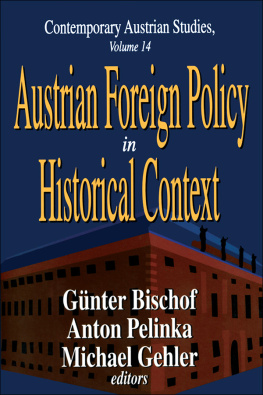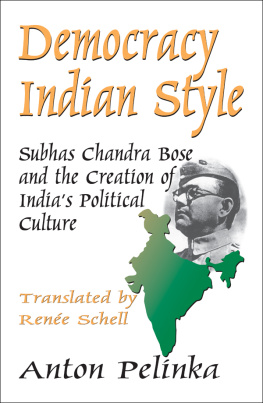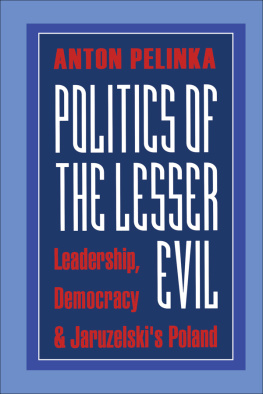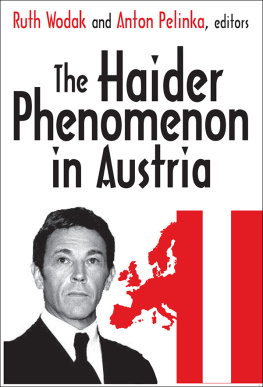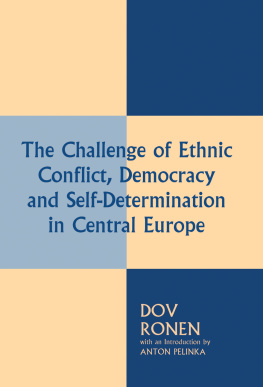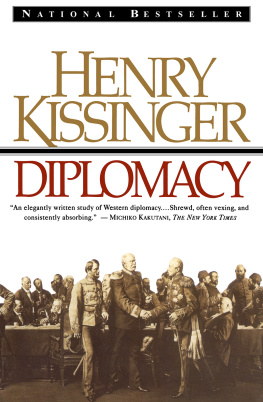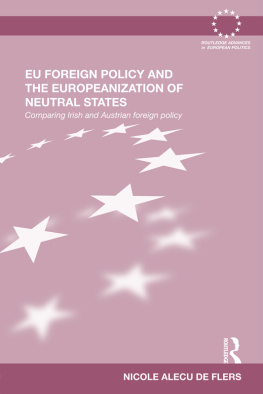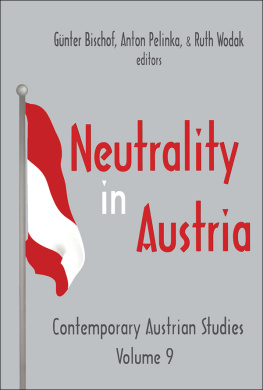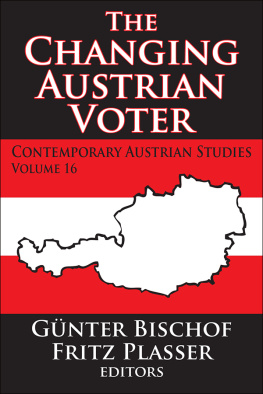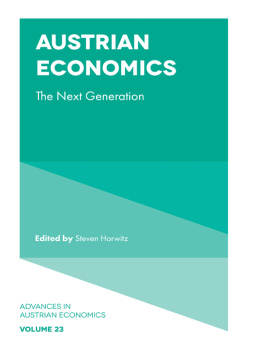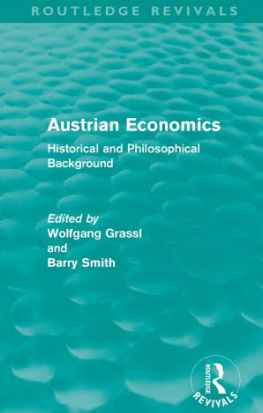Austrian Foreign Policy
in
Historical Context
Contemporary Austrian Studies
Sponsored by the University of New Orleans and Universitt Innsbruck
Editors
Anton Pelinka, University of Innsbruck
Gnter Bischof, Center Austria, University of New Orleans
Production Editor
Judy Nides
Copy Editor
Jennifer Shimek
Editoral Assistant
Gerald Steinacher
Executive Editors
Franz Mathis, UNO Coordinator, University of Innsbruck
Robert L. Dupont, Dean, Metropolitan College
Advisory Board
Ingrid Bauer
University of Salzburg
Siegfried Beer
University of Graz
Evan Bukey
University of Arkansas, Fayetteville
Mario Caciagli
University of Florence
Gary Cohen
Center for Austrian Studies
University of Minnesota
Michael G. Huelshoff
University of New Orleans
Wilhelm Kohler
Tbingen University
Jacques Le Rider
University of Paris VIII
Kurt Richard Luther
University of Keele
Andrei S. Markovits
University of Michigan, Ann Arbor
Margareta Mommsen
University of Munich
Hanspeter Neuhold
University of Vienna
Max Preglau
University of Innsbruck
Sonja Puntscher Riekmann
University of Salzburg
Peter Pulzer
Oxford University
Oliver Rathkolb
University of Vienna
Sieglinde Rosenberger
University of Vienna
Dieter Stiefel
University of Vienna
Franz Szabo
Center for Austrian Studies,
University of Alberta
Ruth Wodak
University of Lancaster
Publication of this volume has been made possible through a generous grant from the Austrian Ministry of Foreign Affairs through the Austrian Cultural Forum in New York and the Austrian Marshall Plan Anniversary Foundation in Vienna. The University of Innsbruck and Metropolitan College of the University of New Orleans have also provided financial support.
First published 2006 by Transaction Publishers
Published 2017 by Routledge
2 Park Square, Milton Park, Abingdon, Oxon OX14
4RN 711 Third Avenue, New York, NY 10017, USA
Routledge is an imprint ofthe Taylor & Francis Group, an informa business
Copyright 2006 by Taylor & Francis
All rights reserved. No part of this book may be reprinted or reproduced or utilised in any form or by any electronic, mechanical, or other means, now known or hereafter invented, including photocopying and recording, or in any information storage or retrieval system, without permission in writing from the publishers.
Notice:
Product or corporate names may be trademarks or registered trademarks, and are used only for identification and explanation without intent to infringe.
Library of Congress Catalog Number: 2005055906
Library of Congress Cataloging-in-Publication Data
Austrian foreign policy in historical context / edited hy Gunter Bischof,
Anton Pelinka, Michael Gehler.
p. cm.(Contemporary Austrian studies; v. 14)
Includes bibliographical references.
ISBN 1-4128-0521-X (alk. paper)
l. Austria-Foreign relations-20th century. I. Bischof, Gunter, 1953-II. Pelinka, Anton, 1941-III. Gehler, Michael. IV. Series.
DB96.A87 2005
327.436009'04dc22
2005055906
ISBN 13: 978-1-4128-0521-6 (pbk)
Table of Contents
INTRODUCTION
Austrian Foreign Policy after World War II
Michael Gehler, Gnter Bischof
The Second Austrian Republic (1945/55 to present) has een a much more successful democratic regime than the first one (1918-1933/38). Sixty years is a long period in history, and it is time to take stock. In this introduction, we are suggesting a framework of periods for the entire postwar foreign policy era. Austrian foreign policy saw its ups and downs over the past sixty years, but experienced even more difficult choices between the two World Wars. The primacy of foreign policy for the elites in the Austrian center of power on Viennas Ballhausplatz may be the defining subtext of these essays.
Austria is a small country and experienced an unusual amount of interference in its foreign policy choices from the international arena. Austria-Hungarys defeat in World War I led to the breakup of the Habsburg Empire. The German speakers in the Alps and along the Danube, left over from the dissolution of the dual monarchy and not appropriated by the succession states, began to build an untested and unstable new state. Stuck between unfriendly neighbors to the south and east and tom between Italy and Germany, Austria tried to negotiate an independent and quasi-neutral course during the interwar period. Abandoned by Benito Mussolini after 1936/37, Austria was absorbed by Adolph Hitlers Nazi Germany in 1938 and wiped off the map for the next seven years.
The experience of the Nazi occupation, more than anything, stirred both the desire among many Austrians and the will among the Allies fighting Hitler to reestablish a viable Austrian state and to build a nation. Liberated by Allied armies in April/May 1945, Austria suffered under an interminable four-power occupation for the next ten years, but also managed to stabilize its democratic system and its economy under the tutelage of the Western powers. From 1955 to 1989/90, neutral Austria sailed an independent course between the power blocks in the East and the West. The great Austrian historian Friedrich Heer said many years ago that no country in Europe has been shaped more dramatically by outside forces and factors than Austria.
Austrias location in the center of Europe determines its difficult geopolitical environment. During the Cold War, a quasi-iron Curtain divided the country for ten years (1945-1955). With the advent of neutrality in 1955, the Iron Curtain dividing Europe overshadowed Austrias freedom to act in the international arena. Austrian statesmen took an active role in overcoming this East-West divide to ease Austrian foreign policy choices. When the Cold War ended, Austria again found itself in a position to mediate and broker between East and West. It has availed itself of this opportunity more in the business and financial realm than in the political arena.
Austrian accession into the European Union in 1995 was as radical a turning point for Austrian foreign policy as the end of the four-power occupation and the arrival of neutrality in 1955. The Ballhausplatz henceforth ceded much of its foreign policy sovereignty to the joint EU institutions in Brussels. This tacit loss of sovereignty and space for maneuvering within foreign policy is one of the foci of this volume. At no point in time over the past sixty years, then, was Austria an agent entirely free to maneuver in the international arena as it saw fit. Yet Austrian statesmen were frequently hindered by domestic constrictions as wellpolitical, economic, personal, and others. Such domestic policy factors in a democratic polity can never be ignored. These essays show that Austrian diplomacy and Austrian statesmanship found ways both to mitigate the domestic pressures and the constrictions of the respective international regimes before and after World War II. Like any government, Austria pursued its own distinct foreign policy goals circumscribed by its geopolitical position. The main story of the following essays in many ways concentrates on the leverage of the weakthe maneuvering space Austrian foreign policy elites created

